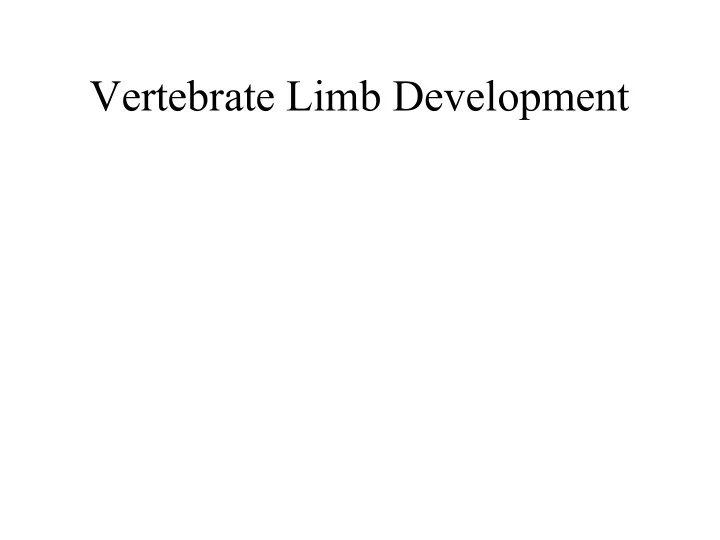

Vertebrate Limb Development
Limb Buds - Day 3
Limb Disc surrounded by Limb Field
Limb Field • Forms limb bud • Only part of limb field required – All parts of the limb field have the capacity to produce a limb – Transplant experiments
Nematode induced limb duplication in frogs
Limb Bud Formation • Mesenchyme cells from the lateral plate mesoderm proliferates and migrates toward limb bud location to form the skeleton • Myotome cells follow to form the musculature
Limb Bud
Mesenchyme induction • Lateral plate mesoderm cells that migrate start expressing Fgf10 (arrows) – Paracrine factor – Activates limb forming genes in ectoderm and mesoderm
Ectopic limb – cells expressing Fgf10 transplanted into embryo
How does the limb bud know where to form? • Hox gene expression
How is limb type determined? • Tbx4 expressed in hindlimbs (somite 25) • Tbx5 expressed in forelimbs (somite 17)
Pattern Formation in the Vertebrate Limb. • Induction plays a major role in pattern formation. – Positional information, supplied by molecular cues, tells a cell where it is • relative to the animals body axes . Homeobox-containing ( Hox ) genes play a role in specifying the identity of regions of the limb, as well as the body as a whole.
Mutual Induction Limb Bud stage Somatic mesoderm Ectoderm to become AER AER mesoderm proximal to distal growth Apical ectodermal ridge (AER). • Secretes fibroblast growth factor (FGF) proteins. • Required for limb growth and patterning along the proximal-distal axis. –
FGF-4 Injection
FGF-4 Can Replace AER Function
Sonic Hedgehog expression - ZPA Acts like Spemann organizer Determines developmental axis
Hox Expression Domains
ZPA Transplantation Effects Hoxd Expression
Apoptosis Separates Digits
Apoptotic pattern determined by signals in mesoderm
Sonic Hedgehog Expression
Feed me then leave me alone
Recommend
More recommend